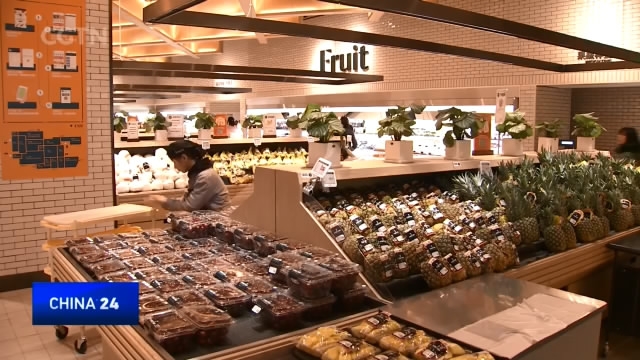
21:10, 11-Feb-2018
China Fresh Food Market: E-commerce companies eye a slice of offline pie

Amongst China's competitive e-commerce sector, fresh food is shaping up to have the highest growth potential. This comes as consumers are pursuing a higher quality lifestyle. CGTN's Wei Lynn Tang takes a look at the role of big e-commerce players, and the possible implications for the smaller, brick-and-mortar stores.
One bag tailing after another, systematically too, at that... Inside are vegetables, fruits, and meat, that you ordered online, and you can get them delivered within 30 minutes if you live within 3 kilometers away. JD-dot-com's very first own fresh food supermarket, 7Fresh -- alongside Alibaba's Hema stores, amongst others -- is just one of the latest moves by e-commerce bigwigs. Now, the fresh food sector has been around since you and I were born. Why the sudden interest? Professor Liu Chunsheng says it's not just that e-commerce players are looking for new forms of business.
LIU CHUNSHENG, ASSOCIATE PROFESSOR CENTRAL UNIVERSITY OF FINANCE AND ECONOMICS "From the perspective of storage, logistics, packaging, and price – the difference between the online and offline channel isn't very large. Both also require high upfront costs. Secondly, the consumption level for this sector is high because of China's huge population."
Picking your favourite seafood and getting it cooked on-site… Finding the origin of fruits by just scanning them, if you're curious... And paying for your items with facial recognition... Professor Liu links this with the growing demands and purchasing power of Chinese consumers.
WEI LYNN TANG BEIJING China's online fresh food market has been growing at a compound annual growth rate of above 80 percent from 2013 to 2016, according to market research consulting firm iResearch. But analysts believe the growth potential for this market is still huge, as it only accounts for over 3 percent of total retail sales of agricultural products. And keep in mind as well, China's online retail penetration – while increasing – stands at only 15 percent.
Besides, there's the high cost of building a complete cold chain logistics platform. China E-commerce Research Center estimates only 1 percent of the companies are profitable, with 88 percent of them losing money.
Professor Liu says it isn't realistic to expect profits in the short-term from a new innovative method. Just like others in the industry, he believes the fresh food sector will slowly consolidate.
LIU CHUNSHENG, ASSOCIATE PROFESSOR CENTRAL UNIVERSITY OF FINANCE AND ECONOMICS "There will be impact towards the smaller traditional players but not until the extent of them retreating, as these e-commerce players are targeting the middle to upper-class segment, while the rest are geared more towards the mass market."
A local fresh food store owner, Mr. Wang, says his store is still profitable but acknowledges small stores can't compete with the big ones.
WANG XUELIN LOCAL FRESH FOOD STORE OWNER "We used to make 30 percent gross margins but it's now about 20 percent. As long as we manage our store well, keep our fruits fresh and liked by customers, we should be okay."
E-commerce players using big data to capture consumer trends; keeping things fresh and of quality, and speedy, efficient service. How will traditional supermarkets maneuver? It will be interesting to see how the transformation of this sector pans out, and perhaps, even spur change in retail as a whole. WLT, CGTN, Beijing.

SITEMAP
Copyright © 2018 CGTN. Beijing ICP prepared NO.16065310-3
Copyright © 2018 CGTN. Beijing ICP prepared NO.16065310-3